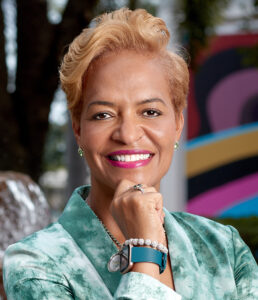Writer: Felipe Rivas
 2 min read June 2021 — The virtual level playing field has unveiled a new layer of challenges and opportunities for higher education institutions. Ava Parker, president of Palm Beach State College, provides the post-COVID lay of the land for higher education in Palm Beach.
2 min read June 2021 — The virtual level playing field has unveiled a new layer of challenges and opportunities for higher education institutions. Ava Parker, president of Palm Beach State College, provides the post-COVID lay of the land for higher education in Palm Beach.
How would you characterize Palm Beach State College’s experience with online learning?
We were pleased with having a significant portion of the infrastructure at the ready when we had to make the transition to remote instruction. We have small classrooms and they are designed that way so that faculty can develop a real relationship with students. It is critical for both social and academic issues. When you take that away via a transition to this remote environment, it is very different. We found ways to engage with students. Our faculty was astoundingly creative in ensuring we could still engage in different ways, thinking outside the box.
Some of our classes did not transition. There were certain courses that we just had to shut down and reopen, such as public safety, fire and welding courses that are hands-on. Moving forward, we are going to offer several options, because that is what the next generation of students need . We are going to expand the number of face-to-face courses that we offer. Some students love the idea of being able to take what we call a live remote class, as it enables them to take courses at either of our five Palm Beach County campuses. We are also working to offer a hybrid learning modality as well. We are focused on options we hope will encourage students to find what makes the most sense for them and engage in those classes so that they can stay on track.
How did your institution tackle student retention and new enrollments in this environment?
We were in a very interesting position last summer; we actually had our highest summer enrollment in the history of the college. It was a great thing. From there, however, enrollment started to decline. This summer, we are not seeing any of the growth that we experienced this time last year. Students went to school in the summer, which they don’t traditionally do. They came in the summer, fall and spring and probably reached a point where they want a break. Also, when everybody goes remote, your competition is completely different. We don’t have as many transient students as we would normally have because they have the option of taking courses from their home institution and just do so remotely. When so many things are remote, it is difficult to distinguish yourself, to show why we are a better option because our competition is across the board. We are now competing against colleges and universities all across the country.
We’re training our faculty so that they can find ways to be just as effective, whether they are in person or remote. About 75% of our students work and go to school, so it’s about trying to offer services and classes in ways and at times that makes sense for them. We are remaining competitive because we are economic engines. My job is to make sure that we are working with employers so that we are producing students that they want to hire. We are designed to be partners with our workforce community so they will have people already trained and ready to go to work. We try to distinguish ourselves as showcased by our engineering program and the close relationship that we have with the aviation industry in the northern part of our county, as well as with NextEra and Florida Power and Light. It is an understanding of their training needs, an ability to turn labs and our campus into spaces that look like what our students will be facing when they enter the workforce.
What is Palm Beach State College’s contribution to equitable opportunities and social mobility?
Colleges across the state mirror their communities. Our students are about a third Black, a third white and a third Hispanic. Our institutions are very diverse. Unfortunately, the data has shown that students tend to complete their education almost based upon their ethnicity. Our Hispanic students do better than our Black students and then our white students do better than our Hispanic students. We will not let your ethnicity determine your trajectory here. We created the Dr. Barbara Carey-Shuler Cross-Cultural Equity Institute, which is specifically designed to take a look at why it is that students are not graduating at the same rate and shed light on what it is we can do to assist students with that.
As a public college, with all the things that were going on in the community, it became important for us to be a place for people to come, whether it is electronically or in person, and have a dialog about what is going on. The issues that occurred in our country over the last year really shone a light on the disparities that people had no idea about. We have an equity officer here at the college. We have always had a person in that position, and they just had more work to do to ensure that we provided opportunities for an exchange of information and ideas so colleagues would know how their colleagues were feeling and that they would be able to address their issues. We are also developing a Diversity, Equity and Inclusion (DEI) certificate for businesses and corporations, specifically designed for the business community so they can create great awareness but also opportunities for solutions and dialogue. Not only is it the right thing to do for your employees, it is also positive for companies’ bottom line.
